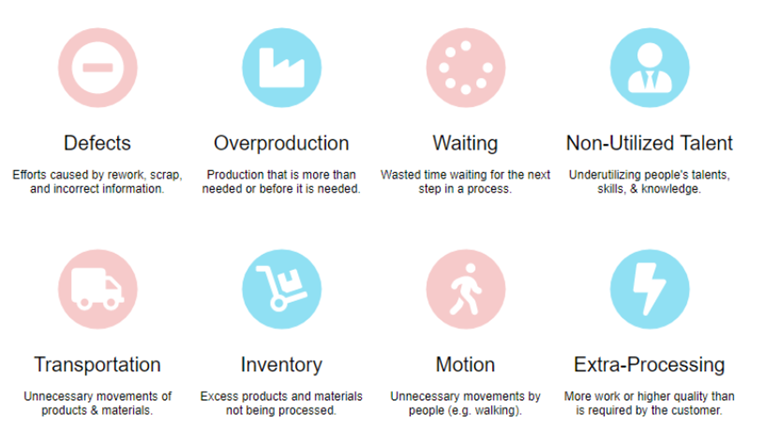“Reduce to improve” is an effective and simple concept used to get improved results in many organizations – if you select the correct variable. In this piece, our focus is on organisational waste and how it relates to the Economy.
In today’s intricate business landscape, economic challenges like inflation and downturns are more frequent and having greater impact. According to a recent article published by the International Monetary Fund, global growth is expected to drop from 3.5% in 2022 to 3.0% in 2023 and 2024. While the 2023 forecast is slightly improved from April’s World Economic Outlook, it still falls short historically.
External factors certainly play a role in these challenges, but there’s an often-overlooked internal factor that can significantly worsen their effects: organizational waste. By looking at how some organizations have faced challenges, and the end results, we can uncover some of the complexities of the relationship between waste and economic outcomes.
In our 2018 series of articles about waste (e.g. Waste of Defects, Waste of Over Production, Waste of Not Utilizing Talent, etc) and our Time Wasters calculator, we spoke about the eight kinds of organizational waste that can take us unawares. In this piece, we take a look at the different economic impacts these different types of waste can have on our businesses, and two best-practices approaches we can take to mitigate their impact to build resilience into our every day.

But first, a parable…
A clear example of organizational waste: The case of Nokia
What happened to Nokia in 2013 is a clear illustration of the significance of neglecting organizational waste.
Nokia was once a titan in the mobile phone industry, but after experiencing the impacts of the full spectrum of organizational waste, suffered a dramatic downfall. The emergence of smartphones caught Nokia off guard, and their slow response to the shifting market exposed deeply rooted inefficiencies within the company, including a decision-making process that was overburdened by bureaucracy and limited their available to pivot quickly. The subsequent decline in market share and profitability underlined the immense costs of organizational waste in fast-changing markets.
A symbiotic relationship not to be trifled with
Taking the lesson from Nokia, we can identify several crucial elements every business must be alert to if they are to overcome organizational waste and optimise their economic opportunities.
Resource allocation under strain
Growing inflation eats into every dollar’s value. Organizational waste makes things worse when you misallocate valuable resources. Not being able to redirect funds in response to changing market dynamics can leave your business out in the cold in the face of an economic storm.
Operational efficiency amid economic downturns
We know agility during economic downturns is critical. Organisational waste can get in the way of our responses though, impeding processes and slowing you down. Added to which is the multiplier effect inefficiency can have on external economic pressures.
One of the best ways to prevent or mitigate inefficiency is by having well-documented processes in place. Of course, you can’t create these overnight, especially in service industries, where it can take time to evaluate and refine processes. But by consistently measuring outcomes and re-evaluating component steps, documenting things as you go, you can develop a strong process you can depend on to carry you through.
Employee engagement as a pillar
Underutilizing skills and stifling talent can put a damper on your employees’ morale and engagement. A disengaged workforce can heighten the challenges of economic adversity. With the threats of further inflation and economic turmoil looming, keeping your team motivated and enthusiastic about efficiency can be a decisive factor in your business’s survival. Create a positive culture with a development framework for each of the different positions with your business, encourage feedback, and identify your high potential employees to get the best from your team and drive your business forward.
What to do about organizational waste
As we said earlier, there are two best-practice approaches you can take to reduce organizational waste, and make your business more resilient at the same time.
Embrace lean principles for efficiency
Lean thinking is a cornerstone in the battle against organizational waste. By identifying and eliminating waste across processes, you can optimize how you allocate resources and watch your operational efficiency grow. Get your staff on board by encouraging them to reduce waste in the business, and share their own ideas for how to support the company’s lean transformation.
Cultivate a culture of adaptability
A healthy business culture is critical for adapting through times of economic adversity. Talk with your staff about different ways you can foster an agile mindset at work, and create opportunities for exploring innovation and adapting to change. A positive and dynamic culture can make a business more resilient and better able to react quickly in the face of an increasingly volatile, uncertain, complex and ambiguous economic environment.
That being said, it can be one of the most challenging aspects of developing a successful business. It takes a focused and committed leadership team to shepherd employees through what may, for some, be a significant change. But it plays a huge role in communicating to staff – and to customers – that you’ve got a clear vision, and that you’re steering the ship in the right direction, for everyone’s benefit.
Another parable: Toyota’s Lean Revolution
The transformational power of reducing waste is exemplified in Japanese vehicle manufacturer, Toyota. Confronted by economic challenges and intense competition, Toyota embraced lean manufacturing principles. This shift revolutionized their operations, reducing their production times and enhancing quality. It also empowered employees. The outcome wasn’t just in cost savings, but also in a newfound competitive edge and resilience.
Next steps
The idea of taking on this kind of shift in the face of the fast pace of every-day operations can seem to be beyond the capacity of some businesses to address. But any small, focused action you take to mitigate the impacts of organizational waste will pay you dividends for years to come. And how many more opportunities could you take advantage of if you weren’t managing unnecessary waste in your business?
The good news is you’re not alone. Way We Do are experts in helping businesses streamline their processes and workflows, and unlock latent potential. So if you can only take that one small, focused action for now, make it reaching out to us. We’ll be your strategic partner on your path to best practice, and you wave good-by to organizational waste once and for all.





